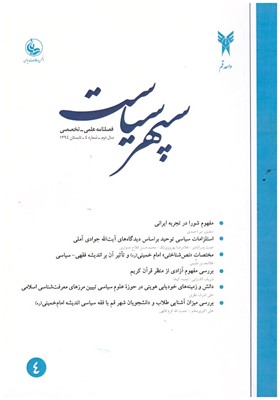تبیین زمینه های انسان شناختی دخالت حداکثری دولت در حوزه تربیت با تاکید بر آراء افلاطون و فارابی
محورهای موضوعی : سیاست پژوهی ایرانی (سپهر سیاست سابق)علی علی حسینی 1 , محمود فلاح 2 , فهیمه قائمی 3
1 - گروه علوم سیاسی، دانشگاه اصفهان
2 - رشته علوم سیاسی، دانشگاه باقرالعلوم قم
3 - رشته علوم سیاسی
کلید واژه:
چکیده مقاله :
Among miscellaneous views on the relationship between people and the state, there are some that believe the state must control the relations between the human and the soul with an educational purpose to bring about prosperity for human beings; a belief, which was developed by Plato in ancient Greek and was explicated and moderated by Farabi on the grounds he set for its development in Islamic thought. In proposing their political views, Plato and Farabi considered education as an essential concept and thought of the state as obliged to make it come true without any limitation. However, of the important questions that are posed to investigate those views is how the human and his needs and abilities are pictured, on the basis of which requirements are taken into account and justified in the form of politico‐educational views to reach perfection. Apparently, that picture shows lack of sureness about humans’ ability to elevate themselves and inequalities among them in using or taking advantage of reason. The purpose of picturing the human being from the standpoint of the thinkers that believe in the involvement of the state in education with a focus on anthropological understanding of the leading pioneers of that view, i.e. Plato and Farabi, is to gain a better appreciation of their politico‐educational measures. A comparative elaboration on the anthropological standpoints of those thinkers and their impact on their politico‐educational views will follow a short introduction to Plato’s and Farabi’s political thoughts and educational prescriptions. This paper will show that the belief in inequality of human beings in using their reason and sensual faculty, distrust in nature and different levels of educability of human beings will necessitate their guidance or control that will result in extremist views on the correction and purification of the human being if followed meticulously.
_||_


